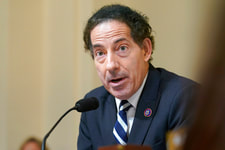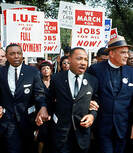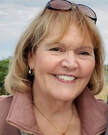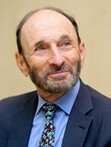weekly column
|
Each week, find a commentary on something connected to verses of Torah or another source of wisdom
|
|
Each week, find a commentary on something connected to verses of Torah or another source of wisdom
|
 ONE-WAY STREET Wisdom Wherever You Find It People place their hand on the Bible and swear to uphold the Constitution; they don’t place their hand on the Constitution and swear to uphold the Bible. Rep. Jamie Raskin In most cities, some streets are two-way and some are one-way. Lots of things in life are that way, too. Your breath flows in and out of the same tubes in your body, but you want each corpuscle to follow all the others in the vessels that carry blood to and from your heart. A movie or book can move back and forth in time, but a working clock moves in only one direction. And while memory can, in some cases, shift and change, there remain some things you just can’t unsee. A friend of mine is the grandson of a renown rabbi. The rabbi once shared his pulpit with a cantor whose musical abilities were remarkable, but who valued his renditions of the prayers over their accuracy. My friend told me of the time the cantor, in embellishing a phrase from a central moment in the service, sang “David ben Yishai, Yishai ben David.” Musically it was lovely. But what he sang was “David son of Jesse, Jesse son of David.” Wrong way down a one-way street. I will acknowledge that things are not always as clear-cut in imagining the direction that things flow – think chicken and egg. But it is not the case with the disease of historical revisionism that has afflicted some Christians in the United States. It has variations and multiple names – Christian nationalism, Biblical patriotism, “corrections” to the accepted knowledge about our founders – but it is part and parcel of the attempt to convince water to flow uphill. No amount of conviction or faith can legitimate the notion that our founders looked into the Bible to construct the Declaration of Independence and/or the Constitution. Rep. Raskin, who is a scholar of the Constitution and, though Jewish in his identity, secular in his outlook, has correctly identified the one-way street every public official travels. To be accurate, one need not place a hand on the Bible to swear to uphold the Constitution. I am guessing Rep. Raskin did not. The symbolism of the Bible – or the Qur’an, or the Baghavad Gita, or the Kitáb-i-Aqdas -- is to impress on the incoming president, mayor, zoning commissioner, or secretary of state that the oath of performance that they are about to proclaim must be as authoritative in public life as heretofore Scripture has been in their private life. Indeed, our collective agreement that raising a right hand during the swearing of an oath is as effective as adding a Bible under the left or “so help me God” to the declaration further illustrates that the integrity of any office relies on the commitment to the ultimate authority of the Constitution to determine our laws and values. To borrow a notion, this truth ought to be self-evident. Unfortunately, it is not. By plucking a phrase selectively from the beginning of the First Amendment that guarantees freedom of conscience (“the free exercise” of religion) and ignoring the immediately preceding phrase that prohibits “an establishment of religion,” a segment of the Christian population concludes that if they believe deeply enough in the authority of the Bible in civil society, the Constitution protects and endorses their convictions. That may be a harmless self-delusion in private, but when an individual – or more dangerously, a group of individuals – attempts to act on that delusion, the result can call into question the legitimacy of the democratic process and the rule of law. When legislatures and courts, after hearing arguments from all sides (including those grounded in faith) reach a conclusion, it is binding on all citizens, not just on those without an objection based in religious belief. The rights guaranteed by our Constitution include equal treatment under the law. By the same token, a citizen may choose not to take advantage of a legally available opportunity. No one is obligated to read everything protected by the right to free expression. No one is obligated to petition the government for redress of grievances. No one is obligated to terminate a pregnancy. Yet, neither is anyone permitted to deny another citizen their own exercise of those legally protected rights. I am hoping that all of these matters are obvious, certainly for private citizens and most especially for those in public service, and even more so for legislators and judges. Whatever personal devotions lead an individual to public service, they are protected by the Constitution. But it is a one-way street, like David son of Jesse. In the end, whatever the correct word for “sacred” might be in civil society, the Constitution is it. No amount of indignation, no level of volume and no uncompromising affirmation can change that. I would swear to it.
0 Comments
 Wisdom Wherever You Find It When you hate other people, you are, in essence, hating yourself…We can choose to hate the other or we can choose to love the other. Kelvin Pierce A few years ago, my friend Peter Maer called me with a request. Peter had a very successful career as a journalist for CBS Radio, and he knows an important story when he encounters it. He had gotten to know the guy he hired to do some work on his house in Northern Virginia. As they talked, he discovered that Kelvin Pierce was the son of William Pierce who was, at one time, the most dangerous white supremacist in America. Under the pseudonym Andrew MacDonald, William wrote the book The Turner Diaries about a white supremacist overthrow of the government. It was the blueprint for both the bombing of the Murrah Building in Oklahoma City by Timothy McVeigh and the insurrection at the Capitol on January 6, 2021. (Especially chilling: the episode termed “the day of the rope” on which Jews, Blacks, and government officials were hanged in public.) Kelvin was shaken by the events in Charlottesville, Virginia in August 2017 and decided it was time to tell his story. Peter brought him to me hoping I could help him to do so. As it turns out, he did not need my meager assistance. His book, Sins of My Father, recounts in unembellished terms the hateful trajectory of the man who became the successor to George Lincoln Rockwell, founder of the American Nazi Party. Kelvin offered his personal testimony to the Virginia Commission on Diversity, Equity and Inclusion. And he continues to speak and write about his terrifying childhood. Perhaps you would consider it sufficient if he simply blew the lid off of the foundations of this racist hate network. Certainly, we are educated and shocked by the misconduct of all sorts of people practicing evil on their fellow human beings – abusers, hatemongers, predators, and others. The ones who bear witness certainly feel a catharsis in the telling and a vindication in the resulting support. The listeners and readers certain feel more sensitized and educated as a result. And perhaps you would be supportive if Kelvin Pierce embarked on his own national tour, using his father’s notoriety to amplify his repudiation of the repugnant philosophy William promoted. But that just doesn’t fit the man Kelvin has become. He kept his head down for a lot of years, raising two adopted daughters from the Republic of Georgia and establishing a construction business (Commonwealth Home Design) that brought him into friendship with Peter – a Jew who represents just about everything his father hated. Softspoken and naturally introverted, Kelvin has put considerable energy into overcoming his fear of being identified with his father’s legacy. It was Charlottesville that impelled him to make a choice to embrace the good man he had become and carry a message aimed at mitigating the damage his father caused. It seems especially appropriate to me that Kelvin Pierce is a builder by trade. Each Saturday night, when Jews conclude Shabbat and begin the work week ahead, we recite a verse from Psalm 90: May the favor of Adonai, our God be upon us; may the work of our hands be established for us; may the work of our hands be established. Kelvin is not Jewish, but he epitomizes this verse, and not only in his commercial life. As I noted, he is the father of two daughters adopted from Georgia. He and his wife consider them the great blessings of their lives, and so have established a foundation to assist the homes for orphaned and abandoned children in Georgia. The story of his work there – as effective as it has been modestly pursued – is the subject of a brief documentary from Radio Free Europe/Radio Liberty called “Healing Hate.” (If the link doesn’t work, search for it on YouTube; it is worth your time.) It is not possible for one individual, however motivated, to undo the suffering and misery sown by another during the course of a lifetime. And for the child of such a perpetrator who has made the difficult choice to continue the family name, there is a particular frustration in witnessing the poisonous fruit of the family tree consumed to such ugly effect. But it is possible to live a redemptive life in which love, compassion and reconciliation flourish at home, throughout the land, and even across the sea. If you are motivated by hate, whether of others or of yourself, redemption is that much more difficult. But when you discover the transformative power of love, making that choice can redeem entire worlds. Learn more about Kelvin Pierce’s foundation at https://divinechildfoundation.org/.  Wisdom Wherever You Find It So often we overlook the work and the significance of those who are not in professional jobs. But let me say to you tonight that whenever you are engaged in work that serves humanity, it has dignity, and it has worth…All labor has worth. Dr. Martin Luther King, Jr. Eric Hoffer was a longshoreman during the middle of the last century. He grew up in a hardscrabble existence, orphaned, itinerant, and impoverished. Early in his life he recovered somewhat unexpectedly from an injury that took most of his vision, and to protect the return of his eyesight, he read. A lot. And then he began to write. Eventually, as a brief biography notes, “he left the docks in 1964, and shortly after became an adjunct professor at the University of California, Berkeley.” Longshoremen, of course, are the guys who unload cargo from ships at the docks. These days, they are the heroes who are working to overcome the bottleneck in the supply chain that is part of our economic upheaval during the pandemic. Most people remember Hoffer for his philosophical writings, including his seminal work, The True Believer. But his career before and after UCB was just as honorable. All labor has worth. A generation ago, I had an argument with a friend who worked in the White House persuading Congress to reconfigure public assistance. The proposal was to enhance the incentives for recipients to work. I charged in with my belief that it was just a way to save money on welfare expenditures. My friend insisted otherwise. He made the point that in our society, there was dignity in productivity. People would be lifted up, by others and by themselves, if they were working. Society had a responsibility not only to support them, but to encourage them. All labor has worth. Of course, the notion has been abused, as most good ideas can be. The gates to Auschwitz celebrated the liberating power of physical work. The Khmer Rouge consider anyone who worked with their mind instead of their hands to be parasitic. The missing ingredient was serving humanity, all of humanity. But in these last years of quarantine and isolation, we have come to understand the value of the efforts of people we have belatedly termed “essential workers.” Delivery people, trash collectors, shelf stockers, truck drivers, longshoremen – these are the people who, at some personal peril, have made it possible for so many of us to adjust to the current reality. While doctors, lawyers, academics, artists, and clergy, to name a few, remain celebrated for their accomplishments and devotion, the rediscovery of what was not so long ago the consensus about the dignity of workers is more than nostalgia. It is affirmation of a truth. All labor has worth. King’s words were spoken shortly before he was assassinated. While most people associate his last speeches with the lofty sentiments about the Promised Land – “I may not get there with you” – because they seemed tragically prophetic, too often we overlook that they were spoken on behalf of striking sanitation workers in Memphis. More than fifty years before we returned the designation “essential workers,” this hero of human dignity and civil rights was reminding the men who were often used as cautionary examples for affluent families that their job had dignity. All labor has worth. With understandable impatience, we are hearing from rights activists that they are tired of hearing people merely echo Dr. King’s words. It is long past time for action, they insist. Part of that effort is the emphasis on securing voting rights for all citizens, demolishing the obstacles historical and recent that disadvantage segments of the population when they try to exercise the franchise. But that’s not the only kind of action we can take. Every one of us can treat the workers we know better – you never want to be the worst part of someone else’s job, as Rabbi Eric Solomon says. For all of the controversy, labor unions remain the most effect means of ensuring collective rights for workers; they should be held to account, but never opposed. An honest week’s work should result in an honest week’s pay; it should take only one full-time job to support a family. And until that’s the standard in the land, that little extra self-taxation we call a tip should be considered a moral obligation. Not every longshoreman can be a philosopher. And not every philosopher can be a longshoreman. But whenever you are engaged in work that serves humanity, it has dignity, and it has worth. All labor has worth.  Wisdom Wherever You Find It The story makes the pain more tolerable. Dr. Valerie Larkin Human beings love stories. When all is said and done, it is not the opposable thumb or language or the proclivity to believe conspiracy theories that separates us from the rest of the animal kingdom. It is stories. I used to think it was the ability to transmit knowledge without direct experience, but that is just pretentious way to say “stories.” Everyone loves stories, and the most beloved members of our societies are the storytellers. We are most honest when we acknowledge them for telling us tales – authors, filmmakers, musicians, painters, sculpturers, dancers – that they create to co-opt our imaginations and plunge us into the delight that comes from being led to a corner of our minds we had not yet explored. But sometimes we give them different names like politician, researcher, advocate, clergy. They indulge our desire to be told stories that we can imagine are far from fiction and, therefore, describe our reality. And human beings suffer pain. Pain is a necessary part of life. Physical pain serves a dual function for us. It warns us of external danger. One of our kids used to love to crawl under the dining room table. We would always say, “Don’t stand up.” For a while, it would be followed by a bang and a wail. The pain eventually persuaded the little one of what the instructions could not. Pain also alerts us when something is wrong within our bodies. From a strained muscle to a kidney stone, there is no denying when our bodies are communicating something to us. What we do with that information is ours to decide. And then there are stories we tell ourselves when we are feeling pain. Many of them are spurred by the faith or superstitions that are handed to us by others. A debate in the Talmud took place almost 2000 years ago about why people suffer. One rabbi claimed that all suffering is deserved, but it is meted out on a sort of sliding scale; the more righteous the person, the smaller the infraction that provokes pain. The other rabbi insisted that pain brings us closer to God who empathizes with human suffering. The debate is left unresolved. But some of the stories we tell ourselves contextualize the pain. Why does my heart ache? Because she loves someone else, because he dumped me. Why do I lash out at my boss even when the criticism is legit? I am never appreciated for what I do right, which more than balances the negatives. Why have I failed to achieve my goal? Well, a long time ago… Dr. Larkin is a therapist who listens patiently to the stories her clients bring to her. Then she asks questions, which can be uncomfortable. But in the end, it is all about identifying the pain. The goal, I imagine, is mitigating the pain rather than distracting from it with the story. Because, as she says, the story makes the pain more tolerable. And here’s the point: stories are not bad. They are, however, stories. A narrative is not necessarily fiction, neither is it inherently fact. Each one blazes a path from beginning to (presumed) end that may be well-trod or the road less taken. The delight of a story is that it explores a possibility without exhausting others. As enlightenment, provocation, entertainment or a dozen other functions, a story serves well. As explanation…not always. I am not accusing you of willful self-delusion. As a human family, and as subgroups of that family, we have used stories to make sense of our world and the pain we understand as inevitable. Backbreaking work and the trauma involved in bearing a child is a lot more tolerable if our story involves being created in the divine image and suffering for our disobedience. But alleviating the pain seems to me to be the wiser goal than justifying the story. Any story once told can be retold, with a story. As I began, human beings love stories, and for very good reason. They are an affirmation of what makes us human. They allow us to explore the life we traverse, sometimes providing us with insight and sometimes serving as placebo. The inevitable pain of life, whether physical or emotional, is a fact. It may be managed by stories we are told or we tell ourselves, but it should never be masked. Stories are much more enjoyable without the pain.  Wisdom Wherever You Find It Leaders deliver loss. Marty Linsky Wow, I love this quotation. It is the most economical yet comprehensive description of anything I have ever encountered. These three words make a demand on my brain every time I look at them. I had the privilege of learning from Marty Linsky a few times and to read much of what he has written (which is considerably longer). His biography includes being the recipient of deliveries from leaders any number of times and learning from it. I am certain that the way I choose to understand this small sentence today – different from many other times – will not capture a single dimension of what he meant. Perhaps it is too obvious to say that we do not live in a perfect world. But that lack of perfection does not prevent people from feeling satisfied with the world they inhabit. The perfect may be the enemy of the good, but relinquishing perfection as the goal almost guarantees things will never be significantly better than they are right now. That’s too sad to contemplate. In order for anything to improve, it must change. (Change, let’s acknowledge, is not always for the better. However, it’s unusual for people to set out with the intention of making things worse!) Once something changes, it disrupts the complacency and satisfaction of people invested in the status quo. A leader must be able to push people out of their comfort zones at a pace that does not exceed their capacity to adjust. That’s more than seeing where the crowd is headed and running to the front. That’s much less than imposing unilateral modifications. And I hope it goes without saying (but I will say it anyway) that popularity is not the same as leadership. In the United States, we have a tendency to confuse the two. The President is blithely labeled the “leader of the free world,” but what that means is that he won the most recent election. Some presidents have been leaders. Some have merely won elections among the voters who are counted. I can’t believe that after more than a year’s time, countless investigations and fantastical-illogical conspiracy theories, there are still people who believe our last presidential election ended with a fraudulent decision. By any accepted measure – popular vote or electoral vote – the incumbent was turned out of office by the challenger. Let’s name names: Joe Biden was the winner, and Donald Trump was the loser. But popularity is not the same as leadership. As we learned in 2016, when the accepted measures were not so much in sync, earning a title and thus holding a position is not the same as effectively pursuing a more perfect union. The leader is the person who delivers loss and thus opens the path to forward movement. We have seen examples of people who have delivered loss to their followers and paved the way to progress – Jimmy Carter and George HW Bush come to mind, as well as countless state and local officials who placed the welfare of the community above their personal aspirations when they had to deliver loss. I know Linsky was not thinking of Donald Trump when he distilled his wisdom into this one pithy saying. When I heard him say it, no one imagined a Trump candidacy, let alone presidency. On January 6, 2021, we saw the definitive evidence that President Trump was not our leader. He may have had deep personal convictions that he should remain in office for a second term, but he could not deliver loss. The boundaries he broke down were not to necessary progress, but to self-serving regression. As we now know, even people in his camp – media flacks, political allies, his own family – urged him to deliver loss to the rioters and insurrectionists, and he refused. The result was the most profound threat to our republic since the War of 1812. And we should not be sanguine about the removal of barriers around the Capitol and the investigations being conducted within it. A huge percentage of Americans still harbor suspicions about the validity of the 2020 election and wish to put the former president back in the Oval Office, even without the reversal of the official, legal, investigated constitutional process that removed him. The only way for us to move forward into our collective future is through leadership. And leadership delivers loss. As I said, Linsky did not speak about Trump, and when I collected his words, I was not thinking about Trump. I have considered this insight every time I have looked at leadership and every time I have looked for leadership. Loss is hard to accept, especially the loss of what is familiar and comfortable. But what awaits is not what used to be great, but what has yet to be great. |
Archives
October 2023
Categories |